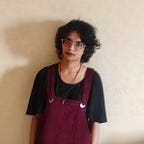If institutionalised religion is an oppressive force, religious guilt is its brother. Karl Marx himself was called anti-semitic for his statements reinforcing stereotypes in ‘On The Jewish Question’. A natural explanation for his sentiments, so given, was that he was trying to distance himself from Judaism, for as a Jewish person living during the growth of Antisemitism in Europe, he didn’t want Marxism to be called a Jewish thought. As a Muslim living during the growth of Islamophobia, I sympathise. I am scared of my identity. I am guilty of not being the perfect representation of my identity. I am ashamed of my identity. I love my identity. In relation to my faith, all I have are a confusing cacophony of thoughts and emotions, and in this essay, I will attempt to untangle them.
Loving my identity is a complex thing. It implies an unconditional love, a doubtless love. But faith requires doubt, for strength of any particular thing is not measured by one’s conviction to it but by the willingness to resolve problems arising in it. Not to mention, being a Muslim is one part of my identity, I am also queer and mentally ill. My gender identity is fluid, my perception of the world around me is odd and ever-changing. In the face of the Islam that I was taught in my various madarasas and schools, these identities cannot co-exist in peace. According to an overwhelmingly huge number of the population, my existence is simply impossible — a paradox.
I grew up in an extreme Wahabi town in Saudi Arabia called Abha, hub of The Preachers, The Materialists and The Zealots. I did not grow up in a conservative family. My parents hardly cared about rituals, though I knew how to perform them. My belief in God was strong, but that wasn’t enough. My practices were judged by the various warring schools of thought my classmates’ parents enforced upon them, and at every test, it failed. My faith was simply impure. I was going to be punished in hell. Repeatedly. Eternally. The behemoth face of a militaristic God loomed over my childhood. That is who I was acquainted with. It was only much later, through thought and study that I met the forgiving and kind God. But by then the other demon had come, uninvited, unwelcome and unkind — Shame.
Shame is more than a feeling, it is a bodily sensation. It exists there within your nervous system, in your heart and in your soul. A heavy, rotten feeling. The rush of the fears of abandonment and rejection by society. When I returned from Abha to Mangalore when I was sixteen, my conservative friends were replaced by the socially aware ones. They were warm and affectionate, loving and lovable, a whole community — one that I’ve never had, and I decided I would do anything to win them over and be by their side forever. But they were remarkably different from me.
Shame is a common tool employed by the privileged to murder the identity of the underprivileged — a slow death. I was ashamed of my wish to perform Salah, the wetness of my feet after Wudu, the urge to thank God after sneezing. The bliss of prayer was then replaced by dread at performing it. Slowly, I shed these habits. They only distanced me from God. Instead I embraced the community I had bought with such a hefty price. And the guilt kept growing. And in this strange crossroad, I still stand — aware, but powerless to change the narrative that traps me.
Religious freedom implies the ability to choose without influence. Choices made in vacuum are a myth. Every road I walk to self discovery is a war path. Confusion of identity is a crime. But the truth is, there is no end to this. I will always be confused by Islam, and my queerness, and my love, and by the nature of knowledge itself. If God is indeed forgiving, he forgives my confusion. I have heard it said that Hajj is not the journey, it is the intention. I intend indeed to be closer to God. Therefore, religious freedom, to me, is not just a matter of choice, but a divine permission to keep questioning and being confused and end in a standstill. Religion is a performance, Faith is an exploration.
